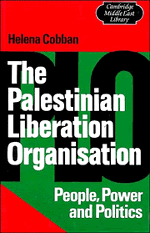Book contents
- Frontmatter
- Contents
- List of illustrations
- Preface
- Abbreviations
- Map 1 Palestine and the surrounding areas
- Introduction
- Part I History of the PLO mainstream
- 2 The phoenix hatches 1948-67
- 3 The joy of flying 1967-73
- 4 Caught in the Lebanon net (1973-76)
- 5 The net tightens (1977-80)
- 6 The broken wing (1981-February 1983)
- Part II Internal relations
- PART III External relations
- Conclusions
- Appendixes
- Notes
- References and select bibliography
5 - The net tightens (1977-80)
Published online by Cambridge University Press: 26 January 2010
- Frontmatter
- Contents
- List of illustrations
- Preface
- Abbreviations
- Map 1 Palestine and the surrounding areas
- Introduction
- Part I History of the PLO mainstream
- 2 The phoenix hatches 1948-67
- 3 The joy of flying 1967-73
- 4 Caught in the Lebanon net (1973-76)
- 5 The net tightens (1977-80)
- 6 The broken wing (1981-February 1983)
- Part II Internal relations
- PART III External relations
- Conclusions
- Appendixes
- Notes
- References and select bibliography
Summary
The Lebanese war of 1975–76 did not, in the end, prove as damaging for the Palestinian guerrilla movement as the rout they had suffered in Jordan in 1970–71. As the other guerrilla leaders welcomed PLO Chairman Arafat back to Beirut from the Arab summit meeting in Cairo in October 1976, they could at least be relieved that the Arab governments in general, and Lebanon's new President Elias Sarkis in particular, had formally agreed to reiterate the validity of the agreement reached in Cairo eight years previously which allowed and regulated the guerrilla presence in Lebanon. Though Arafat had failed, at the Cairo summit, in his last-minute attempt to limit the role of the Syrian army in the Arab Deterrent Force established for Lebanon by the summit, nevertheless the guerrillas still enjoyed considerably more freedom of military and political action in their principal base in Lebanon than the Syrian government had appeared ready to grant them in the harsh days of the Palestinian-Syrian fighting of summer and autumn of 1976.
The most important decision the Fateh leaders faced in the period following the Lebanese cease-fire was how best to use what freedom of manoeuvre they still enjoyed (in Lebanon and elsewhere) to pursue the national goals from which they saw the 19 bruising months of fighting in Lebanon as having diverted them. Certainly, the Lebanese war had had its effects upon the political balance both inside Fateh and inside the PLO as a whole. Given the complexity of the political process inside Fateh, these changes took quite a time to work through its internal system, and continued to cause controversy inside the movement for the next couple of years.
- Type
- Chapter
- Information
- The Palestinian Liberation OrganisationPeople, Power and Politics, pp. 81 - 107Publisher: Cambridge University PressPrint publication year: 1984
- 1
- Cited by



